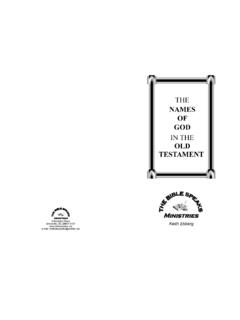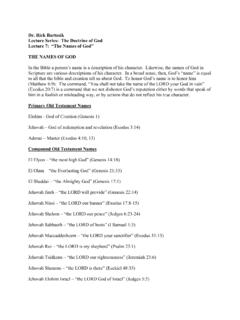Transcription of Systematic Theology: The Doctrine of God
1 Systematic theology The Doctrine of god Christ s Community Study Center Mbarara, Uganda July, 2012 i Systematic theology : The Doctrine of god Christ s Community Study Center Mbarara, Uganda Donald F. McNeill Systematic theology The Doctrine of god Christ s Community Study Center Mbarara, Uganda July, 2012 ii The Doctrine of god Table of Contents I. The name of god 30 II. OT Names of god 31 A. EL or Elohim 32 B. El Elyon and El Shaddai 32 C. Yahweh 33 1. The active presence of god 33 2. The aseity of god 34 3. The immutability of god 34 4. The redemptive name of god 34 D. compound Names which Include Yahweh 35 1. Yahweh-Sabaoth 36 2. Yahweh-Jireh 36 3. Yahweh-Shalom 37 4. Yahweh-Nissi 38 5. Yahweh-Tsidkenu and Yahweh-Mekkodishkim 39 6. Yahweh-Rapha 39 7. Yahweh-Raah 39 8. Adonai 40 III.
2 New testament Names of god 40 A. Theos 40 B. Kurios 40 C. Pater 40 D. Jesus (Jesus Christ) 44 1. The incarnate manifestation of god 44 2. The name exalted above all other names 44 3. The exclusive name by which men must be saved 45 E. Son of Man 45 F. Holy Spirit 46 IV. The Attributes of god 47 A. The Focus upon the Essential Nature of god in Contrast to His Creation 49 1. The Aseity of god 49 2. The Infinity of god 49 3. The Immutability of god 49 4. The Incorporeality of god 50 B. The Focus upon the Essential Nature of god in His Authority over Creation 50 1. The Supremacy of god in Providence (Omnipotence) 50 2. The Supremacy of god in Knowledge (Omniscience) 51 3. The Supremacy of god in Wisdom 51. C. The Focus upon the Essential Nature of god in His Interrelationship with Creation 52 1.
3 God s Moral Conduct in Relation to His Creation 52 a. Holiness 52 b. Righteousness 54 c. Truth 55 d. Wrath 57 2. God s Goodness to His Creation 58 a. Liberality 58 Systematic theology The Doctrine of god Christ s Community Study Center Mbarara, Uganda July, 2012 iii b. Mercy 58 c. Love 59 d. Grace 62 e. Patience 64 f. Faithfulness 64 D. The Goodness of god and the Problem of Evil 64 1. Best-Possible-World Explanation of Evil 65 2. Free-Will Explanation of Evil 66 3. Character-Building Explanation of Evil 67 4. The Indirect-Cause Explanation of Evil 67 5. The ex Lex Explanation of Evil 67 6. The ad Hominem Defense 68 7. The Biblical Response to the Problem of Evil 68 8. The Biblical Response to the Problem of Evil 69 V. The Holy Trinity 70 A. The Doctrine of the Trinity in the old testament 71 B.
4 The Doctrine of the Trinity in the New testament 71 C. The Distinction between the Ontological Trinity and the Economic Trinity 72 1. The Ontological Trinity 72 2. The Economic Trinity 73 a. God the Father 73 b. God the Son 74 c. God the Holy Spirit 75 D. Unity and Diversity in the Godhead Practical Implications of the Trinity 76 1. The basis for love in all human relationships 77 2. The basis for the proper functioning of the family 77 3. The basis for social justice and the protection of civil rights 78 4. The basis for the proper functioning of the church 78 VI. The Works of god 79 A. The Work of god in Predestination and Election 81 1. Election in the old testament 81 2. Election in the New testament 83 3. Objections to the Doctrine of Election 86 a. It is not fair to elect some and not others. 86 b. If someone desperately wants to be saved, he can t unless he is one of the elect.
5 87 c. The Doctrine of election teaches fatalism. 87 d. If men are predestined for salvation, there is no need to evangelize and preach the gospel. 87 e. The Doctrine makes us robots. 88 f. Unbelievers should not be held responsible for their unbelief, since they were not the elect. 88 g. The Doctrine contradicts other passages of Scripture which seem to teach the opposite. 89 4. Conclusion to the Doctrine of Election and Predestination 89 B. The Work of god in Creation 90 1. The Type of Literature in Genesis 1-11 91 2. The Outline of Genesis 1-4 91 3. Absolute Creation 92 4. The Manner of Creation 93 5. Six Day Creation 95 Systematic theology The Doctrine of god Christ s Community Study Center Mbarara, Uganda July, 2012 iv a. The First and Second Day Separation of Firmament from the Waters 95 b. The Third Day The Seas are Collected in One Place, Dry Land Appears, Plant Life Appears 96 c.
6 The Fourth Day Sun, Moon, and Stars in the Firmament 98 d. The Fifth Day Life in the Seas and the Skies 98 e. The Sixth Day Life on Earth and the Creation of Man 98 6. Conclusion 101 C. The Work of god in Providence 102 1. The Scope, Extent, and Purpose of Providence 102 2. Providence and Secondary Causes 103 3. Other Acts of Providence 105 4. The Necessity of Prayer 105 Systematic theology The Doctrine of god Christ s Community Study Center Mbarara, Uganda July, 2012 30 The Doctrine of god I. The name of god In Biblical usage names are not given without purpose but are used descriptively. For example, Adam gave names to the animals in accord with their nature. He also gave a name to his wife appropriate to her co-equality as the image-bearer of god . Frequently the Bible gives the meaning of a name and the reason for its being assigned to a person (Gen. 3:20; 4:1; 5:29; Matt. 1:21). On other occasions names were changed or a surname was added to indicate a new function or relation ( :5).
7 Another example is Jacob s name , which means supplanter , being changed to Israel which means one who strives with God (Gen. 32:28). Simon s name was changed to Peter after his great confession of the identity of Jesus (Matt. 16:18). We also know that Jesus received a name that is above every name (Phil. 2: 9-10). We gather from this that the name of god reveals who He is. Giving a name to someone or some thing in the oriental context of the OT meant having superiority over that person or thing; thus, Adam named the animals rather than the animals naming him. Adam named his wife because she was taken from him and not the other way around and because she was to be in submission to him as his helpmeet. (He was not superior to her as a fellow image-bearer of god .) But who can give a name to God? This question begs yet another question: Who is superior to God, and who is qualified to describe God? The answer is: No one. Therefore, God must give Himself a name .
8 Thus, in the name of god we have the self-revelation of god . God is telling us in Scripture who He is; as the Psalmist says, As is Thy name , O God [Elohim], so is Thy praise to the ends of the earth (Ps. 48: 10). It is important to understand that only God can name himself. In pagan religions, the worshiper is supposedly enabled to exercise control over the gods or demons by using their names names which originated with men in incantations. Whenever a witch doctor in Africa is employed to call down a curse upon another person, he makes use of the spirit world of demons and assumes control of these demons to accomplish his own purposes. Animistic religions are intrinsically (fundamentally) man-centered since the purpose of worship is essentially to get what you want from the gods, not to discover what they want from you. And since most religions have no self-revelation of the gods, there is very little that worshippers may know of their pagan deities except through subjective experiences of divine displeasure or approval.
9 The gods are either happy with you or angry with you on the basis of your performance. Carl F. H. Henry observes that without the self-revelation of god in Scripture, false religions can only stammer God s true name . Apart from special revelation, mankind in sin articulates [pronounces] the divine name in an alphabet of false gods (Ashtaroth, Judges 10: 6; Baal, Judges 2: 11; Chemosh, Num. 21: 29; Dagon, Judges 16: 23; and so on through Zeus, Acts 14: 12) a panorama of pagan divinities that biblical theology exposes to the lash of divine wrath in prophetic-apostolic denunciation (Henry, God, Revelation, and Authority, Vol. II., p. 171). Even many people who profess to be Christians are really not worshipping the God of the Bible, but are modified animists, attempting to use God to provide personal achievement, peace, affluence and psychological self-esteem. They have no intention of examining the self-revelation of god in the Scriptures to find out what He requires of them.
10 The most important thing is what they require of god . If He delivers what they want, they will worship Him only as the means to an end personal fulfillment and happiness. For such people, the name for God is Money (or Mammon , the god Jesus talked about repeatedly [Matt. 6: 24]), Power , Influence , Success , Sex , Happiness , or any hundred other names. Systematic theology The Doctrine of god Christ s Community Study Center Mbarara, Uganda July, 2012 31 The story of Balaam (Numbers 22-25) indicates in no uncertain terms that God cannot be manipulated to do what He does not wish to do. We may call upon Him humbly in supplication and petition, but we may not and cannot use His name as a means of controlling Him or obtaining our selfish desires, for such a use of god s name would be equivalent to taking His name in vain, a violation of the third commandment (Ex. 20: 7). Henry continues: Nowhere does Systematic theology , as a discipline of study, move nearer the heart of the Bible than when it expounds the revealed names of god .


